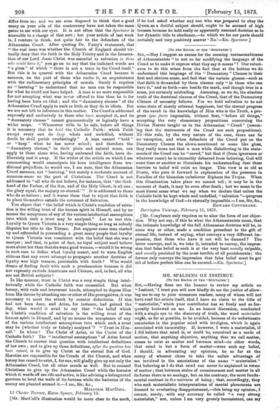tually deny that the faith in the Holy Trinity and
in the Incarna- Sin,—May I suggest an excuse for the seeming unreasonableness tion of our Lord Jesus Christ was essential to salvation in those of Athanasianista "in not so far modifying the language of the who could have it," you go on to say that the italicised words are Creed as to make it express what they say it means"? Our reluct- " a glow; " of which "there is not a trace in the Creed itself." ance to do this arises from the fact that at the bottom we do But this is to quarrel with the Athanasian Creed because it understand this language of the " Damnatory " Clauses in their assumes, on the part of those who recite it, an acquaintance first and obvious sense, and feel that the various glosses—such as with the rudimentary principles of morals. Surely it requires that faithkiii demanded by these clauses only "in those who can no " learning " to understand that no man can be responsible ' have it," and so forth—are beside the mark, and though true in a for what he could not have helped. A man is no more responsible sense, yet certainly misleading. Assuming, as we do, the absolute for not accepting what was never offered to him than he is for truth of the doctrinal clauses of the Creed, that of the Damnatory having been born an idiot ; and the " damnatory clauses" of the Chases of necessity follows. For we hold salvation to be not Athanasian Creed apply to such as little as they do to idiots. But shine state of Merely external happiness, but the eternal progress we are not left to inference in this matter. The Creed is addressed of the saved in the knowledge of Him who is the Truth, a pro- expressly and exclusively to those who have accepted it, and its grass ipso facto impossible, without first, "before all things," " damnatoiy clauses" cannot grammatically or logically have a accepting the very elementary propositions concerning the wider scope. "'Whosoever wills to be safe, before all things Divine Nature taught us in the Athanasian " Creed " (assum- it is necessary that he hold the Catholic Faith : which Faith ring that the statements of the Creed are such propositions). except every one do keep whole and undefiled, without T5 :this rule, by the very nature of the case, there can be doubt he shall perish everhil'itingly." A man cannot " hold " no 'exception, and when defenders of the Creed put on the or " keep " what he has never seized; and therefore the Danthatory Clauses the above-mentioned or some like gloss, " damnatory clauses," in their plain and natural sense, can they really mean not that a man while disbelieving in the state- apply to those alone who, having embraced the faith, have de- menteof the Creed can be "saved," but that if (from ignorance or liberately cast it away. If the writer of the article on which I am whatever cause) he is excusably debarred from believing, God will commenting would emancipate his keen intelligence from tra- some time or another so illuminate his understanding that these ditional prejudices, he would see, I am sure, that the Athanasian barriers to belief will exist no longer. This view is as old as Creed assumes, not "learning," but merely a Moderate amount of Dante, who puts it forward in explanation of the presence in common-sense on the part of Christians. The Creed is not Paradise of the blameless unbeliever Riphaus the Trojan. When addressed to "all who do not believe, for instance, that the God- this illumination takes place we cannot tell ; it may be in the head of the Father, of the Son, and of the_Haly Ghost, is all one ; moment of death, it may be even after death ; but we mean in the the glory equal, the majesty co-eternal.'" .,it is addressed to those most literal sense what we say when we declare that unless the who do so believe ; and it warns them that to reject that faith is Catholic faith be kept whole and undefiled, "salvation "—progress
to place themselves outside the covenant of Salvation, in the knowledge of God—is eternally impossible.—I am, Sir, &c.,
EDWARD CONYBEARE.
Barrington Vicarage, February 11, 1873.


































 Previous page
Previous page